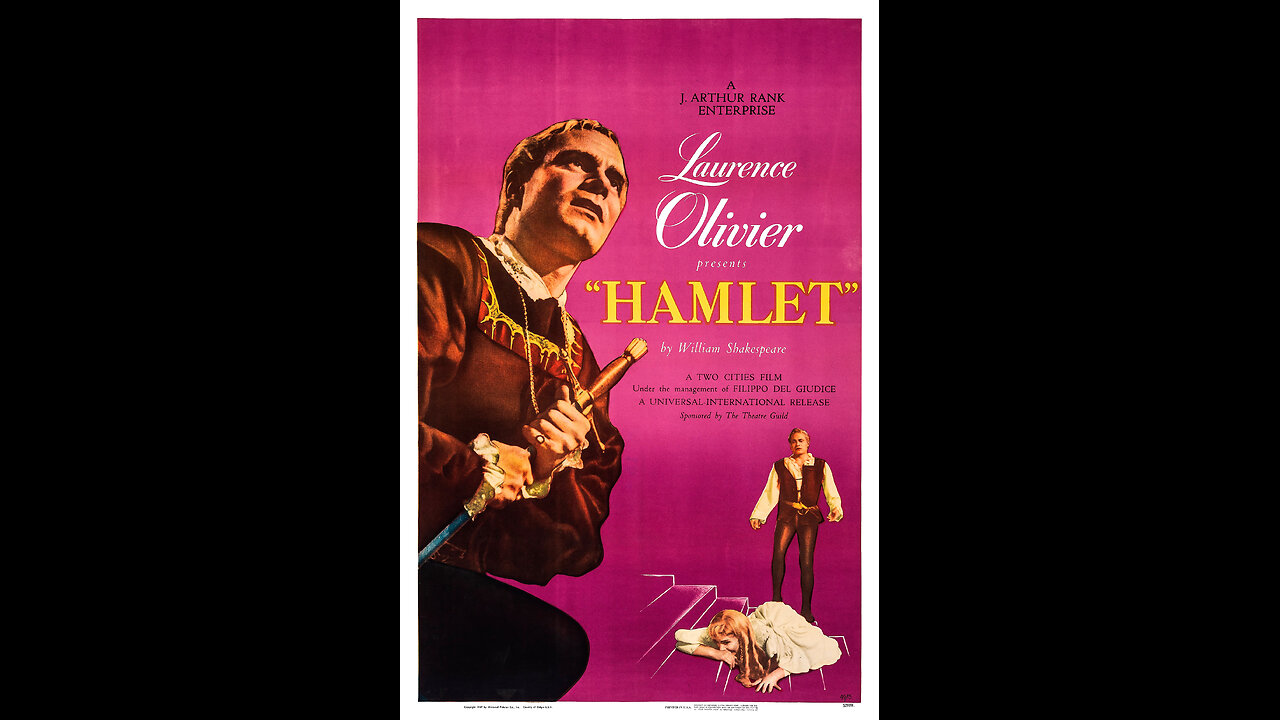Premium Only Content

Hamlet (1948) | Directed by Sir Laurence Olivier
"Hamlet" (1948), directed by Sir Laurence Olivier, stands as a seminal adaptation of William Shakespeare's iconic play. Olivier not only directed but also starred in the film, portraying the titular character, Hamlet. The film, which won four Academy Awards, including Best Picture and Best Actor for Olivier, is widely regarded as a classic Shakespearean adaptation.
One of the most notable aspects of the film is Olivier's masterful direction and performance. His interpretation of Hamlet is nuanced and powerful, capturing the internal conflicts and torments of the character with remarkable depth. Olivier successfully navigates Hamlet's psychological complexities, bringing a profound understanding of the character's turmoil to the screen. His command of Shakespearean language and his ability to convey the emotional subtleties of the text contribute to the film's enduring impact.
The cinematography of "Hamlet" is another standout feature, with Desmond Dickinson's camera work skillfully capturing the visual grandeur of Elsinore Castle and the moody, atmospheric settings. The film's stark and expressionistic visuals enhance the overall mood, underscoring the play's themes of betrayal, madness, and revenge.
The supporting cast, including Eileen Herlie as Queen Gertrude, Basil Sydney as King Claudius, and Jean Simmons as Ophelia, delivers strong performances, complementing Olivier's central portrayal. Herlie, in particular, brings depth to the character of Gertrude, providing a poignant counterpoint to Olivier's Hamlet.
The film's pacing and editing maintain a balance between the intricate language of Shakespeare and the narrative's dramatic tension. The adaptation is faithful to the original text, yet Olivier's cinematic choices enhance the storytelling, making it accessible to a wider audience without sacrificing the essence of Shakespeare's language.
While some critics may argue that Olivier took liberties with the play, such as making cuts for cinematic flow or altering the order of certain scenes, these decisions are often seen as necessary adjustments for the medium of film. Olivier's "Hamlet" succeeds in capturing the essence of the play while offering a cinematic experience that remains faithful to the spirit of Shakespearean tragedy.
In conclusion, Laurence Olivier's "Hamlet" (1948) is a landmark film that brings Shakespeare's timeless play to life with unparalleled artistry. Olivier's direction and performance, supported by strong cinematography and a talented cast, contribute to the film's enduring status as a classic adaptation of one of the greatest works in English literature.
-
 1:36:14
1:36:14
Classic Films & Movies Archive
7 days agoApartment for Peggy (1948) | Directed by George Seaton
2511 -
 12:31
12:31
Robbi On The Record
6 hours ago $2.92 earnedWhy Nothing Feels Real Anymore | The Science, Culture, and Spiritual War Behind the Fog
26.7K9 -
 18:42
18:42
Navy Media
6 hours agoHouthis ATTACK the Wrong U.S. Fighter Jet – Then THIS Happened…
27.8K32 -
 40:24
40:24
MetatronGaming
1 day agoSomething is REALLY Wrong with this apartment...
21.4K2 -
 LIVE
LIVE
SpartakusLIVE
5 hours agoHUGE NEW UPDATE - Aim Assist NERF, New META, New MOVEMENT || #1 King of Content
574 watching -
![battlefield 6 with the crew! [RGMT CONTENT Mgr. | RGMT GL | GZW CL]](https://1a-1791.com/video/fwe2/7f/s8/6/w/D/y/F/wDyFz.0kob.18.jpg) 2:32:26
2:32:26
XDDX_HiTower
4 hours ago $1.67 earnedbattlefield 6 with the crew! [RGMT CONTENT Mgr. | RGMT GL | GZW CL]
27.5K -
 2:28:57
2:28:57
Nikko Ortiz
5 hours agoVirtual Reality Milsim... | Rumble LIVE
32.8K4 -
 DVR
DVR
StevieTLIVE
4 hours agoNEW UPDATE Warzone WINS w/ The Fellas
14.9K -
 9:00:32
9:00:32
Dr Disrespect
14 hours ago🔴LIVE - DR DISRESPECT - WARZONE x BLACK OPS 7 - SEASON 1 INTEGRATION
149K7 -
 1:25:00
1:25:00
Sam Tripoli
6 hours ago $3.30 earnedPunch Drunk Sports LIVE!
22K2